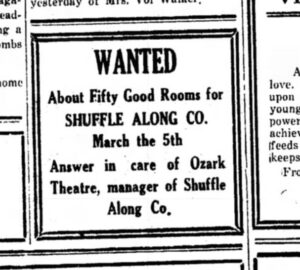YOUR DAILY DOSE OF EUBIE!!!!
It wasn’t easy to tour an all-black show during the days of Jim Crow—even when the show was playing Northern towns. The company had to find restaurants and lodgings that would accommodate black patrons. Getting accurate accountings from each theater for box office receipts was often tough, too. Eubie explained how the company managed during its pre-Broadway days: “We’d play one-night—if we were lucky, two-night—stands. No one knew us, so they’d only book us for a short time. We’d get good reviews in one town, but before they could do us any good we’d be on to another town—that is, if we had the money. One night Sissle and I were sitting on the steps of a building, and Sissle was writing out checks. They weren’t any good until we could wire the box office receipts into the New York bank—we were always one day behind at the very least. I looked up. “Sissle”’ I say, “Do you know where you’re sitting?” “No,” he said, and looked around. We were sitting on the steps of the jailhouse, writing bum checks! We broke up in a fit of laughing and couldn’t stop.”
To save money on lodgings, the company booked rooms in boarding houses and private homes in exchange for tickets for the show. On one occasion they had no money so Lyles talked a cab driver into lending them some cash to pay for their lodging with the promise that the New York office would repay him later. As Blake told it, “There were five of us. Miller and Lyles slept in one bed, Sissle in another; Paul Floyd, who was in the show, was in the bed with me. All night long the chinches [bedbugs] had a picnic, and Paul kept waking me up, slapping the chinches.”
The next morning, they tried to sneak out of the rooming house but the large proprietor blocked the steps demanding his money. They couldn’t get past him no matter what. He berated them, “I didn’t trust you minstrel n****rs! You’re all no good!” Lyles replied, “Sir, the boy will be here with the money very soon.” Astoundingly, the cabbie actually came and paid the bill.
But the show’s creators did not starve. As Flournoy Miller said, “You learn a lot of tricks on the road. Sissle and I would visit people who were boarding some members of the cast—always at mealtime—and I would take a bite of everything on the table and insist that Sissle taste it too, because it was so delicious. Then we’d go to another house and do the same thing—we usually had plenty to eat.”

As much as the main company had difficulty on the road, the “B” or second company—led by producer George Wintz—faced even more problems because it primarily toured cities in the Deep South. The show’s producers were so desperate that they took the unusual step of running a display advertisement looking for rooms while they were appearing in Fayetteville, Arkansas, for an upcoming booking in Springfield, Missouri. It must have been deeply humiliating for the black cast to have to scramble to find places to eat and sleep.